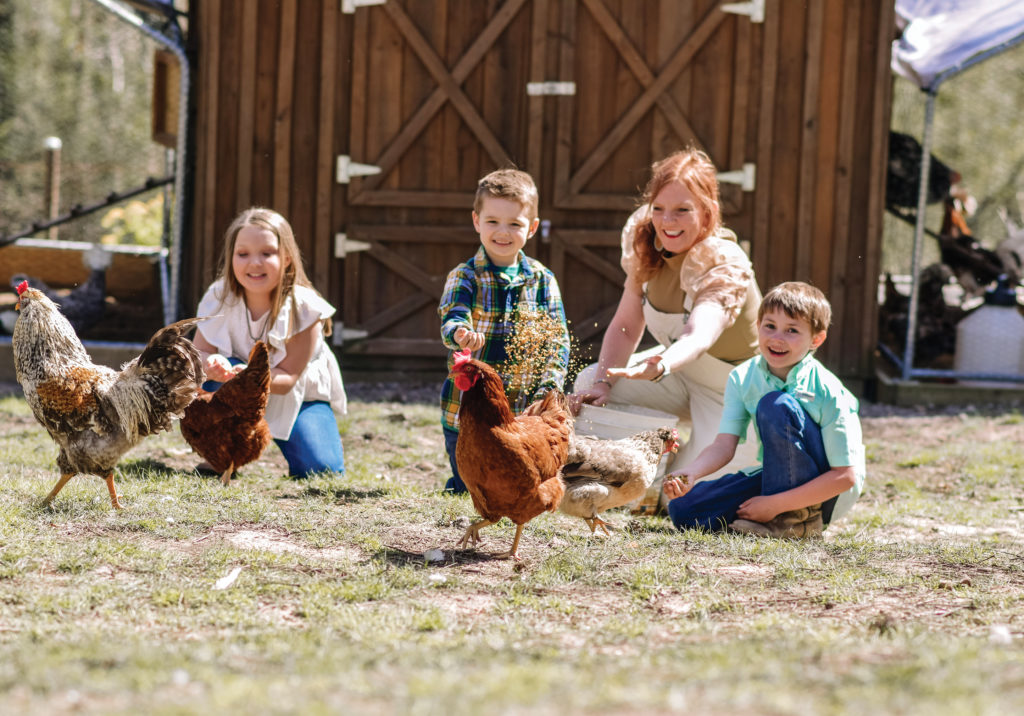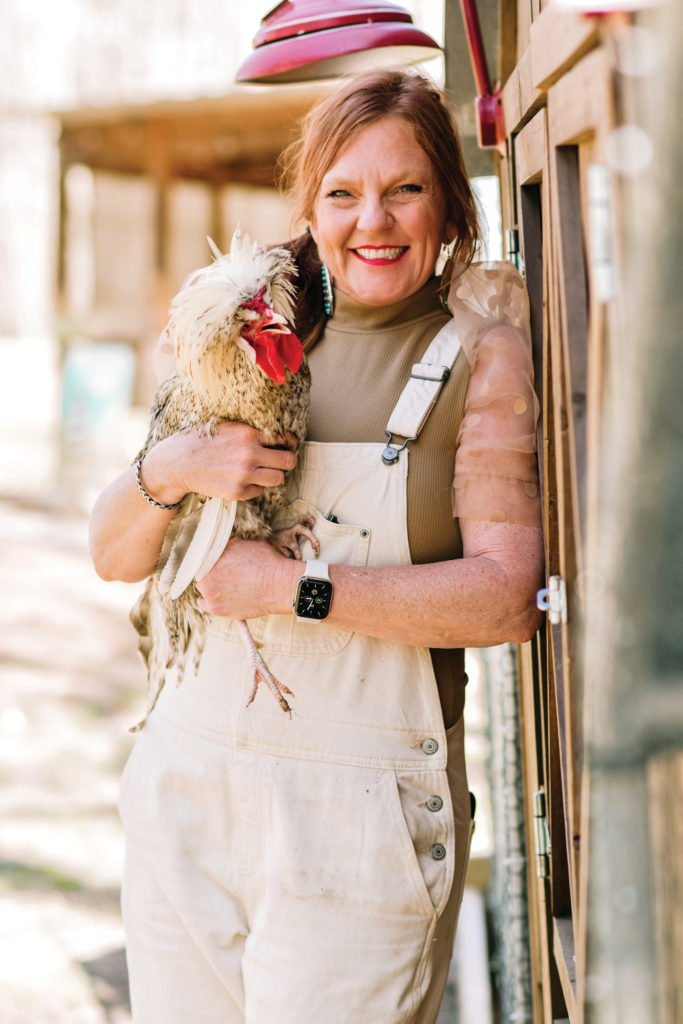By Jennifer Crossley Howard
City girl turned full-time farmer shares passion for animals and education

On a recent cold spring day, goldenrod glowed against dull, gray skies and porch swings floated idle on the county roads that lead to Snead’s Farmhouse. Judy Snead – farmer, educator, animal wrangler – walked to the side of her house and greeted her flock.
“Mama’s here!” she called with glee as she opened the gate. On command, a menagerie of chickens, pigs, ducks, peacocks, roosters and white turkeys came running with the enthusiasm of puppies. Every creature is welcome at Snead’s Farmhouse, amongst the crowing, oinking, cackling and mooing, and whatever sounds an alpaca makes.
These farm animals educate their Cullman County community and beyond about how they grow, and what it takes to run a small farm. So many of these species thrive together rather than being segregated, a typical farm practice. The notion of inclusivity, along with teaching and sharing the pleasures of how such a farm works, is what led to Snead reaching out to the public and schools.
Snead’s Farmhouse, a member of Cullman Electric Cooperative, is a 501C3 nonprofit educational farm that sits down many a winding road between Old Highway 31 and Alabama 157. It sprang unintentionally, and in Judy Snead’s case, in the middle of a pandemic. Her husband, a welder and carpenter, was transferred from Stapleton to north Alabama. Snead’s stepdad was sick and moved with the family in April 2019.
When they arrived at their new homestead deep in the woods of Cullman County, Snead was out of her element. “I am not a farmer,” she said, dressed in a barn coat and thick-soled boots. “I grew up in the city. I was in sales and wore heels.”
There was a simple wooden chicken coop behind their house that hadn’t been touched in a minute.
“I didn’t know anyone, and I couldn’t leave the house because of care taking,” Snead says. “I was depressed, and my husband said, ‘Why don’t you get some chickens?’” She asked him why she’d want to do that, and he told her fresh eggs.
“I said, ‘I’m not eating any eggs that come out of a chicken’s butt — mine are clean and come from (the grocery store),’” Snead says, laughing.
She has since eaten her own words, in a sense.
Farm animals find homes at Snead’s
It was the pale pastel blue-, gray- and clay-colored eggs that drew her to invest in more chickens, to expand her palette of eggs. Discovering fuzzy-footed chicks with huge hair didn’t hurt. “I thought, ‘Oh dear Jesus I’ve got to have that,’” Snead says, laughing. That led to collecting more species of chickens including Silkies, Tolbunt Polish and Cuckoo. “The more froufrou the chicken is, the harder it is to raise,” Snead says.

Then she decided she had to have a rooster. Then her husband’s cousin gave her Dexter, a Hereford British beef cow, and he had to have a mate, named Dei Dei. Then Penny Lane the duck came along, followed by exotic white turkeys and peacocks. Her husband built a fence at some point, she said, indirectly egging on her collection. Later came Leroy Brown, a mischievous donkey that trots around the pasture not unlike a dog, and a couple of alpacas and goats.
Snead visits schools and gives tours to schools all over the state, including ones from Hartselle, Cullman and Tuscaloosa, Pleasant Grove and Adamsville. She educates her young students about egg incubation — sponsored by Chambers Farm and Garden Supply — and hosts home school classes and field trips for mentally ill and terminally ill adults.
“It’s just fun, and they’re all so excited,” Snead says. A script for a traveling puppet show written by Troy University theater students is in the works.
In the beginning, Snead grasped to find what she wanted the farm’s mission to be. “What do I teach kids?” Snead says. “I can’t be a petting zoo. I’ve got to teach them something.”
The multitude of farm animal personalities live in harmony, not despite of but perhaps because of their differences. Penny Lane, a disabled duck, hobbles about, and Susie Q the chicken flies to Snead and in return Snead sings her lullabies when it’s time for sleep. The animals even help raise each other. A duck sits on a chicken’s eggs, and a baby goat stays with a mother alpaca during the day and goes home to nurse with mom. “She encourages her independence,” Snead says. “Our job is to love.”
Organic growth
The farm’s first visitors came in March 2021, and outside interest seemed to follow an organic growth. At first, short tours of the small farm helped pay for upkeep. Later, other sponsors, including two feed companies, covered $600 a month feed bills and $160 a month for hay.
Chris Chambers, co-owner of Chambers Farm & Garden Supply in Cullman, decided to sponsor Snead for a few reasons. She is a customer, and the sponsorship allowed him to encourage use of a northern seed company not as commonly used in Alabama. She organized Chambers’ Fall Festival last year, and he admires her mission to educate.
“You can learn anything at any age,” he says.
Yet not everyone was a fan. Some local farmers and others from online farm message boards Snead looked to for advice often gave her one response — don’t.
“I’m breaking the rules about having chickens and people on my property,” Snead says. But because she isn’t farming for food, she invites people to tour and learn. Criticism led to tears, but her husband told her, chin up.
“I didn’t plan this, God did,” Snead says. “So I stood up, brushed myself off and kept going.”
It’s her husband, Shane, who Judy attributes to making Snead’s Farmhouse possible. “My husband is my biggest supporter,” she says. “This is what I cherish the most,” she said, her eyes filling with tears. “When I’d bring home a new animal, I’d say, ‘just trust me.’ He allowed me to be me. This is me.”
Shane Snead, with his firm handshake and John Deere hoodie and cap, seems equally at home on the farm. “We have to tag team,” he says. The days of vacations away are over for now. Getting animals ready for bed takes a small village.
“It’s worse than a full-time job,” Shane Snead said, grinning. His wife said he soldiered through after a hernia surgery and tolerating new furry family members.
“It usually takes about three days before I realize and ask, ‘where did that come from?’” Shane Snead says.
Some elderly visitors come to settle into rocking lawn chairs that overlook the animals and just watch. The pigs are so used to playing chase with children that they skip over to visitors teasing them to run.
Perhaps the most apparent personality on this farm is Judy Snead herself. Flame-haired and enthusiastic, she dreamed of being a Broadway dancer growing up. These days her stage is a vast green field in Cullman County, and her audience is loud, furry and quite adoring.
“My kids are in shock,” Snead says. “I think I’m going through a midlife crisis. Most people get a Corvette. I got a farm.”
She said showing her young adult children the result of hard work is worth it all. “They know I’ve finally found my purpose.”




